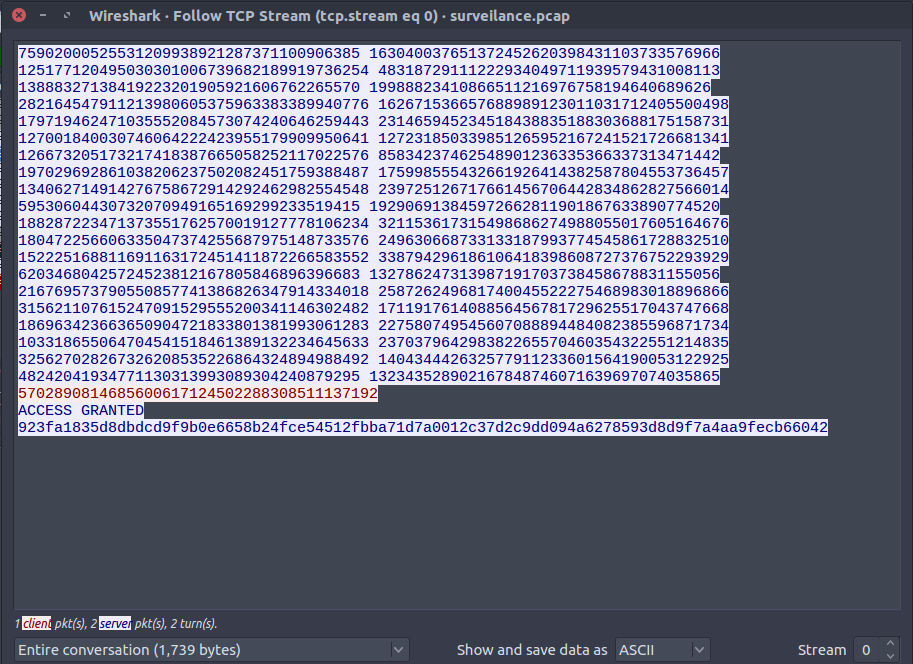Writeup from Junior 35c3CTF’18
Junior 35c3CTF 2018: pretty-linear Category: CryptoChallenge Points: 158Solves: 28
Description:
1 2 3 4 5 The NSA gave us these packets, they said it should be just enough to break this crypto. surveillance.pcap server.py Difficulty estimate: Medium-Hard
This challenge objective was pretty clear - Solve Linear Equation with 40 unknowns
Now starting with *server.py*, we have three sets of variables,
1 2 3 4 5 6 7 8 if __name__ == '__main__' : challenge = keygen() print (' ' .join(map (str , challenge))) response = int (input ()) if response != sum (x*y%p for x, y in zip (challenge, key)): print ('ACCESS DENIED' ) exit(1 )
key
unknown, find 40 of them to get flag
challenge
40 integers per stream, we have 40 of them
response
1 response per stream, again 40 of them
Analysing surveilance.pcap with Wireshark Open the packet capture file with Wireshark. We see mostly TCP packets, and to analyse the TCP packets, click
Analyse > Follow > TCP stream
We have 40 such streams of which, the blue ones are the challenge, and the red ones are response.
The following bash script will extract the data from surveilance.pcap
extract.sh
1 2 3 4 5 6 7 8 infile=surveilance.pcap outfile=out ext=txt for stream in $(tshark -nlr $infile -Y tcp.flags.syn==1 -T fields -e tcp.stream | sort -n | uniq | sed 's/\r//' )do echo "Processing stream $stream : ${outfile} _${stream} .${ext} " tshark -nlr $infile -qz "follow,tcp,raw,$stream " | tail -n +7 | sed 's/^\s\+//g' | xxd -r -p > ${outfile} _${stream} .${ext} done
Solving Linear Equations using Matrices Again, from *server.py*, we get
response = sum(x*y%p for x, y in zip(challenge, key))
So, finally with all the 40 files, we get 40 such equations (where i=range(40) )
response[i] = sum(x*y%p for x, y in zip(challenge[i], key))
Solving linear equation of 40 unknowns can be done easily with Matrices.,reference
Thus, the key will be
1 2 challenge * key = response key = challenge_inv * response
Solving for key using Sage To calculate the InverseMod(p) of the Matrix challenge, sage provides an easy way to this:
challenge_inv = Matrix(IntegerModRing(p),challenge).inverse()
Matrix multiplication of challenge_inv and response yeilds the key
key = challenge_inv * response
1 2 3 4 5 6 7 8 9 10 11 12 13 14 15 16 17 18 19 20 21 22 23 24 25 26 27 28 29 30 31 32 33 34 35 36 37 38 39 40 key = [151166356399959194245460055888166966126L , 23349654305343746371904146512921179610L , 303231127335861985008837572586617401477L , 52564325979162295713031020943288299431L , 318561098467762156502271721157519784045L , 263049694618319332492436935081367988962L , 151925705582116739255625584197651639678L , 46319333286788790879399387215584902926L , 144250191566113115015826218788418570765L , 95097625879948609497612754022619234195L , 40890527924981050968775993543458295905L , 73015657936779070795829412187806965634L , 17764129701686300306686689106838999642L , 325835500394544926294581718484613749556L , 71443020776832402486826429105359001130L , 328905290970722092344104084599942510400L , 246319993494260311894585740502008352891L , 339251916682414225894494357646852524504L , 270753355547506496805860877660621175158L , 266604583518913012106937436764867155955L , 132952188910249324219774647464400732439L , 229485064954594431373138165566214808548L , 273124499649767430591820642695664426994L , 161206428662237066098654588615704724656L , 191676246712534509807283243359699775780L , 110791878778380133926865862999743362183L , 121869512181659437298676494294916884080L , 81324902884339942138294016318959955113L , 219404824444265280645688236691554688702L , 169041597038940530794876375975659802012L , 131851490945732599957487956170326572223L , 337190018815691236060142455413012785269L , 215436829468576180414177636304832181536L , 174614268507338543165725749934608091983L , 316523955444804263394840392424504742312L , 215434679427738924369625297037020081680L , 103769840624100781721896803697739863413L , 302813910848119681638497129402557822574L , 104414047167186149419822776294661649936L , 124689157029586638342169541932443340723L ]
All we have to do next is, create the AES instance using the AES_key = sha256(key)
1 2 3 4 5 6 cipher = AES.new( sha256(' ' .join(map (str , key)).encode('utf-8' )).digest(), AES.MODE_CFB, b'\0' *16 ) print cipher.decrypt(ct.decode('hex' ))
FLAG
35C3_G4uss_w0uld_b3_so_pr0ud_of_y0u_r1ght_n0w
Complete Script P.S you need to install sage to run the script
$sage exploit.sage
1 2 3 4 5 6 7 8 9 10 11 12 13 14 15 16 17 18 19 20 21 22 23 24 25 26 27 28 29 30 31 32 33 34 35 36 37 from hashlib import sha256from Crypto.Cipher import AESimport osp = 340282366920938463463374607431768211297 challenge=[] response=[] key=[] ct = "923fa1835d8dbdcd9f9b0e6658b24fce54512fbba71d7a0012c37d2c9dd094a6278593d8d9f7a4aa9fecb66042" os.system("./extract.sh" ) for i in range (40 ): f = open ("out/out_" +str (i)+".txt" ).read().split('\n' ) challenge+=[map (int ,f[0 ].split(' ' ))] response+=[int (f[1 ])] challenge_inv = Matrix(IntegerModRing(p),challenge).inverse() rl=[] for i in response: rl+=[[i]]response_mat = Matrix(rl) y = challenge_inv*response_mat key = eval (y.str ().strip().replace("]\n[" ,"," )) print keycipher = AES.new( sha256(' ' .join(map (str , key)).encode('utf-8' )).digest(), AES.MODE_CFB, b'\0' *16 ) print cipher.decrypt(ct.decode('hex' ))
